No better place to do a reality check on our environmental vision than Cairo’s Manshiet Nasr neighborhood. Its local inhabitants, the Zabaleen (Arabic for garbage pickers and recyclers) started closing our material cycles thirty years ago, something we even now barely find necessary. They know that what is without value for most, isn’t useless per sé. In their neighbourhood you can see things you see nowhere else in Cairo, recycling, urban gardening, composting and renewable energy.
For them it is not about lifestyle, greenwashing or being eco-bourgeois , but about exploring the possibilities every day innovation has. They are social entrepreneurs and are constantly testing the profitability of what’s possible.
Their hard labour and common sense enabled them to improve their conditions immensely over the years but challenges remain. Manshiet Nasr isn’t connected to Cairo’s gas network and its inhabitants are thus both deprived of hot water and obliged to rely on gas cylinders (or worse, burning garbage) for cooking.
In 2003, this led Thomas Taha Rassam Culhane, a fellow social entrepreneur and PhD student to explore whether solar heaters could solve this, and provide the inhabitants with hot water. When he came to the area, he quickly encountered plenty of handy men, material and a fellow enthusiast Hanna Fathy to cooperate with.
Hanna and his wife Sabah, both born and raised in Manshiet Nasr were willing to pay for the construction of a home-made solar heater on their roof. This prototype then got them funding to build thirteen extra installations in both Darb-al-Ahmar and Manshiet Nasr.
The strength of this project, Solar C3ities, probably lies in how well it is embedded in local society. This is not by chance, Thomas is more than a mere technician and devoted a lot of his time to sensibilisation (go and see his song “Talking Trash” for example). When Thomas left Egypt for Germany, Hanna took charge of the project, and the know-how of how the solar heaters should be built is well spread as well.
Order your heater with Wagdi, Ayman and Moussa (above) and they’ll assemble you one from local material!
Yet, the solar heaters remain expensive, their material costs 3500 Egyptian pound ($650 US dollars) alone. But this isn’t the only thing that scares people off, explains Sabah Fathy: “At first people thought that using the sun to heat their water would bring diseases along. But why, I asked them. Isn’t it God who gave us the sun? So then, how can it be wrong to use it.”
In this strong religious community, home to a stunning rock-hewed church, that was an argument that would do. And Hanna wasn’t the only one advocating solar panels. His mother also uses them, and every once a sceptic appears, she’s keen to convince them by stressing how it works just fine for her.
Organic garbage
The Zabaleen collect a lot of organic waste on their rounds and have always relied on pigs to handle it, until 2009, when the Swine Flue held the world in its grip, and the Egyptian government decided to eliminate all pigs overnight. This suddenly confronted the Zabaleen (and the rest of Cairo) with a new problem, there was no alternative for the organic waste but to pile up in the streets.
In India, Thomas had seen something that could come in handy; a digester able to transform organic waste into biogas, surprisingly low-tech, less pricy than the solar heater (one thousand Egyptian pounds) and with an excellent fertilizer as residue. At present, five of these homemade boilers have been installed.
But convincing people to opt for these digesters isn’t as easy, as it was with the solar heaters. While installing one in Darb el Ahmar, the house lady got scared when she heard it produces gas. Sabah too was sceptic, but for another reason; “There was no need to convince me about the solar heater, I was very enthusiastic. But I was sceptic about the digester, using it isn’t as simple as the solar heater, you have to add the residue manually and I couldn’t imagine how this would go practically.”
A lot of people actually think alike, because you have to blend your organic garbage and add it manually, or as Sabah puts it; “People are used to everything being artificial, that they just have to push a button.”
In general both Sabah and her sister in law Dina like the idea because it is natural, practical, and innovative. Another reason the locals like it, is because it is very safe. The risk of being electrocuted is particularly high in Cairo’s informal areas, and both installations don’t involve electricity.
“And you neither risk ending up with a huge electricity bill,” Sabah adds.
Until now everything works very well, but the idea doesn’t seem to be taking pace. USAid and the British Embassy funded the first installations, but now this stopped, the concept isn’t spreading on its own. The solar heater or the bio gas digester remain costly, a big investment to pay at once. Compare it to how most Egyptian houses are built, one storey every five years, or wahda wahda, little by little in Egyptian. Your average Egyptian only earns a thousand Egyptian pounds, or two hundred dollars a month.
In the meantime gas, petrol and water remain subsidised, which keeps the profitability of investing in renewables low. Before the revolution one cylinder of gas (worth eighty pounds) cost seven pounds, but now you barely find one for the official price of twenty five pounds (on the black market it’s forty pounds).
A family easily uses three cylinders a month, so even now gas alone takes away an important part of the monthly budget.
In the past environmentalists, economists and politicians have argued for the removal of the subsidies, arguing that the squandering of resources is a burden on the national budget and the environment, and would help to promote renewables. But if you see how difficult it is for a poor family to get around, it is clear that the removal of these subsidies could have worse consequences. And there are alternatives, Jamal Himdan of Egypt’s Freedom and Justice Party explained me earlier that they (as Egypt’s biggest party), instead of removing the subsidies, opt for a cross-subsidised system (make the rich pay for the poor). And they do believe in renewables but not for small-scale urban use.
Powerland Cairo: Trash Talking
[youtube]http://www.globalpost.com/video/5683106[/youtube]
Subsidies are not the only obstacle: “Young people in our society adore foreign things. When they graduate from university they all want to work for a big foreign company. It’s about climbing the social ladder. They aren’t interested in buying local, handmade things of good quality, but prefer to buy things that are foreign and expensive.”, Sabah adds.
Lifestyle matters, but not only for the youngsters of Manshiet Nasr. In bordering Ma’adi Heidi Fink, who is active in both Solar Cities and several Ma’adi-based initiatives, tries to spread the same technology using a different story. Ma’adi, an uptown suburb that turned part of the urban sprawl, isn’t as green as it used to be and this has made some local residents are now considering to install biogas digesters or solar heaters on their rooftop gardens.
Solar Cities now hopes that demand from Ma’adi will provide the manufacturers work, and show local youngsters the fashionability of the renewables. Another approach to make the whole idea more appealing for locals, would be to turn Solar Cities from non-profit into an actual company, as those who are least likely to be convinced by the social or ecological arguments (i.e. the government), usually get convinced when money is to be gained.
Solar cities has overcome plenty of challenges, and one can only hope new costumers from Ma’adi gives them the needed momentum. But with the government’s focus on gas, a global shift towards renewables seems to remain wishful thinking. But then again, let’s hope the Zabaleen once more prove our Western thinking wrong.

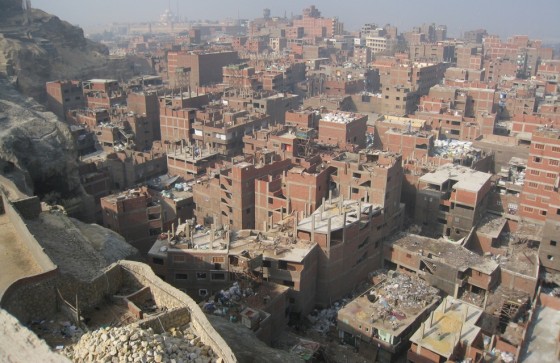
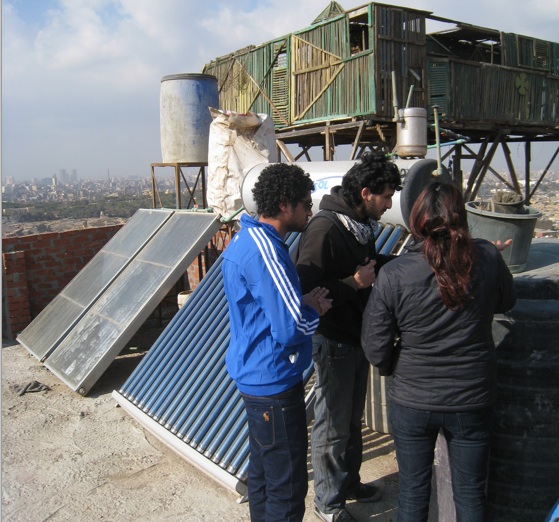
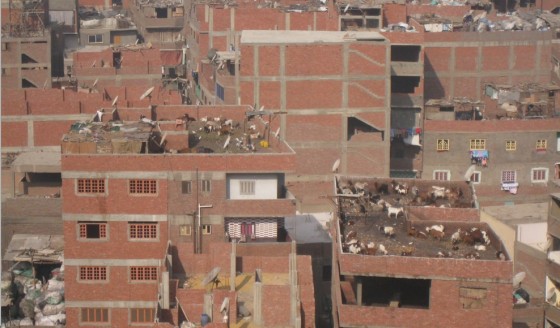

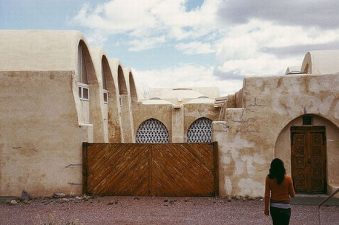
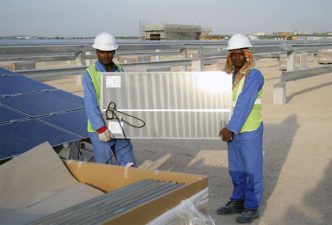
i am interested in building a solar heater please guide me.i stay in india